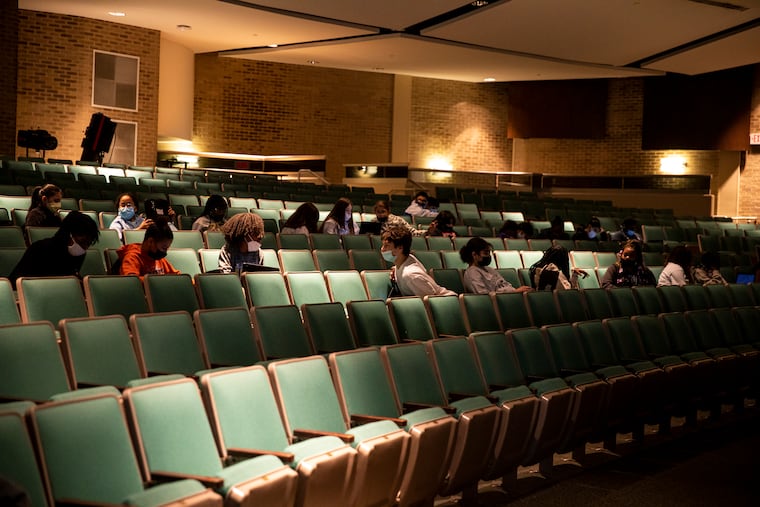How one South Jersey school district is coping with its teacher shortage: A month of early dismissals
Beginning Monday, thousands of students in the Millville school district will go home early. Faced with a severe teacher shortage, the South Jersey district plans to operate on a shortened school day.

When the fifth-period bell rang at Lakeside Middle School in Millville, about 80 students filed into the auditorium — not for an assembly, but for class.
Faced with a shortage of teachers and not enough available substitutes, the Cumberland County school has been sending students to the spacious auditorium when there was no one to cover their classrooms.
Similar scenes have played out across town at Millville High School, where, for several months, classes have been held for certain periods in the gym. Sometimes, there would be hundreds of students from eight or nine classes with two or three teachers present.
“Every day, this was happening,” said Superintendent Tony Trongone. “We have to do something different.”
Now, starting Monday, the district, which enrolls about 5,500 students, plans half-days for its middle and high school students until Feb. 25. Elementary students will remain on a full-day schedule, as well as all teachers.
Students will have shorter class periods to accommodate the abbreviated day, but it’s a change that will eliminate the need to send students to the gym or auditorium, he said.
“Without direct instruction, I don’t care what anybody says, it is a loss of learning,“ Trongone said. “It just wasn’t conducive.”
Like school districts across the country, Millville is reeling from the long-standing teacher shortage that has been worsened by the pandemic. The recent omicron surge made it more difficult, leaving districts scrambling to hire substitutes to cover classrooms for ill or quarantined teachers.
Some states, such as New Mexico, have called on the National Guard and state workers to help out as substitute teachers. New Jersey has eased credit requirements for substitute teachers and made it easier for retirees to return to the classroom without affecting their pension. Pennsylvania also made it easier for retired teachers and recent graduates to work as substitute teachers.
”I’ve been an administrator for 20 years, and this is the worst I’ve seen,” said Lumberton School Superintendent Joe Langowski. His Burlington County district increased pay for certified substitutes from $95 a day to $105.
Langowski said his district has about a half-dozen permanent substitute teachers who fill vacancies. Other staff, including reading specialists and intervention staff, fill in, too.
“Our teachers are truly exhausted,” Langowski said.
The substitute shortage has been especially hard on New Jersey’s vocational-technical county schools, where students enroll in career-focused programs that require hands-on learning, said Jackie Burke, executive director of the New Jersey Council of County Vocational-Technical Schools.
In order to teach specialty subjects such as culinary arts, auto mechanics, and welding, substitutes must have at least two years of relevant industry experience within the last five years, Burke said. She has lobbied the state Department of Education to change that rule.
”There are people who are willing to serve as substitutes but they can’t because of that requirement,” Burke said. “It presents an additional hurdle for our schools to try to find substitutes.”
Trongone said his substitute fill rate has dropped 25% since the pandemic began. One day, there were 115 staff absences, but he could cover only about 40. Administrators have been preparing lesson plans and grading assignments to cover vacancies, he said.
“Try covering all of those teacher classes without substitutes,” he said. “It’s impossible.”
Benjamin Banneker Charter School has been managing without two regular substitutes with teachers covering one another’s classrooms at its campuses in Willingboro and Westampton, said principal Richard Wilson. The school implemented an early dismissal since returning from winter break to reduce the risk of students transmitting the coronavirus during lunch, he said.
On the last regular day of school, on Friday, staff at Lakeside took turns supervising students in the auditorium. Some students could spend several periods there, said principal Spike Cook, who wore a sweatshirt that read: “Staying strong all year long.”
“Obviously, it’s not optimal. We don’t want to sustain this,” Cook said. “But it’s a way for us to put something together to maintain the structure of the school day with so many teachers out.”
» READ MORE: New Pa. law could ease substitute-teaching crisis
Students, sitting socially distanced, were scattered around the auditorium. Their absent teachers left assignments for them to complete on Chromebooks. A few teachers were on hand to offer help.
”It’s been a tough year,” said Scott Parvin, a retired police officer and first-year photography and law enforcement teacher. “It’s also 100% rewarding, just challenging.”
Kirkland Hinds, 14, an eighth grader, used the 40-minute period to catch up on science homework. Sometimes, the students watch a movie on a big screen.
”You get to sit down and get caught up on work,” Hinds said. ”Face-to-face learning usually teaches you more. As long as I’m learning, I’m OK.”
Starting Monday, students at both the high school and middle school will receive grab-n-go lunches before they head home.
At the high school, students will have 20 fewer minutes for each of the four classes held. After students leave, teachers will remain for their lunch break, prep periods, and professional development, said principal Jamie Sutton. Students without transportation will be allowed to remain after school for extracurricular activities.
”The bottom line is keeping kids in school,” Trongone said.